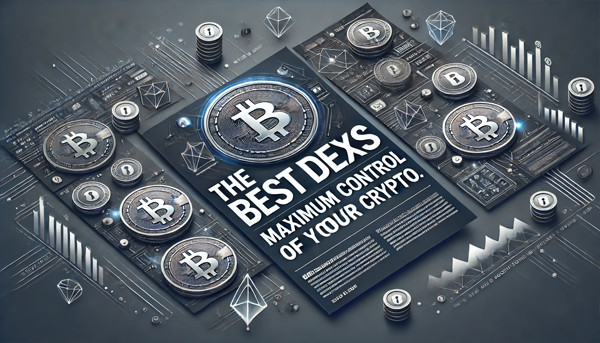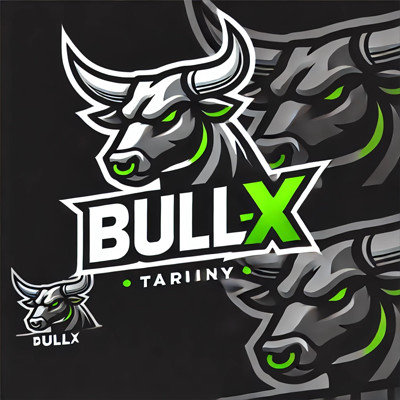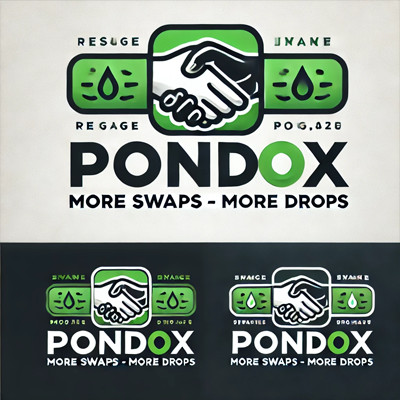The Best DEXS: Maximum Control Of Your Crypto
In the ever-evolving landscape of cryptocurrency trading, Decentralized Exchanges (DEXs) have emerged as a game-changer, offering unparalleled control and flexibility. DEXs operate without a central authority, enabling peer-to-peer transactions directly between users through blockchain technology and smart contracts. This decentralized nature means that traders can maintain full control over their private keys and funds, significantly enhancing security and reducing the risk of hacks and fraud. Moreover, DEXs often provide greater privacy as they typically require minimal personal information, allowing users to trade anonymously and securely.
While Centralized Exchanges (CEXs) have long been the go-to platforms for many traders due to their user-friendly interfaces and high liquidity, the rise of DEXs marks a significant shift in how we manage and trade our digital assets. DEXs offer several advantages over CEXs, including lower fees, access to a wider range of tokens, and increased transparency through blockchain technology. By eliminating intermediaries, DEXs reduce trading costs and provide users with direct access to the rapidly expanding world of decentralized finance (DeFi). In this blog post, we'll explore these benefits in detail and highlight some of the best DEX platforms available today, helping you to make an informed choice about your trading strategy.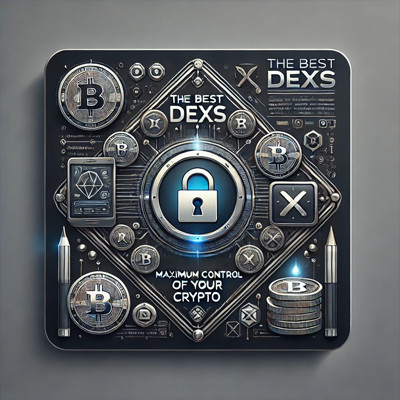
What is a Decentralized Exchange (DEX)?
In the ever-evolving landscape of cryptocurrency trading, Decentralized Exchanges (DEXs) have emerged as a game-changer, offering unparalleled control and flexibility. DEXs operate without a central authority, enabling peer-to-peer transactions directly between users through blockchain technology and smart contracts. This decentralized nature means that traders can maintain full control over their private keys and funds, significantly enhancing security and reducing the risk of hacks and fraud. Moreover, DEXs often provide greater privacy as they typically require minimal personal information, allowing users to trade anonymously and securely.
While Centralized Exchanges (CEXs) have long been the go-to platforms for many traders due to their user-friendly interfaces and high liquidity, the rise of DEXs marks a significant shift in how we manage and trade our digital assets. DEXs offer several advantages over CEXs, including lower fees, access to a wider range of tokens, and increased transparency through blockchain technology. By eliminating intermediaries, DEXs reduce trading costs and provide users with direct access to the rapidly expanding world of decentralized finance (DeFi). In this blog post, we'll explore these benefits in detail and highlight some of the best DEX platforms available today, helping you to make an informed choice about your trading strategy.
TOP DEX
- JUPITER - SOLANA
- BULLX — ETH SOL BASE BLAST ARB BSC
- DBOT DEX — MULTICHAIN
- MEVX - Solana Ethereum Binance
- POND0X: Solana/Ethereum
- RAYDIUM - SOLANA
- KINE DEX : Multi Chain
- KWENTA DEX- MULTCHAIN
- 1DEX: Multi Cross Chain Swap
- ATOMIQ EXCHANGE — $SOL to $BTC DeFi Swap
Top DEX Platforms
BULLX (MultiChain/Telegram Bot Hybrid)
- BULLX DEX and Telegram Trade Platform is a groundbreaking hybrid solution that combines the powerful features of a decentralized exchange with the convenience and speed of a Telegram trading interface. Designed for traders who demand flexibility and control, BULLX offers secure, transparent, and efficient trading across major blockchains including Ethereum, Solana, Base, Binance, Arbitrum, and Blast. With its seamless integration into Telegram, users can execute trades, monitor markets, and manage their portfolios directly from their messaging app, ensuring real-time responsiveness and ease of use. BULLX's advanced features, such as automated trading, liquidity pools, and cross-chain support, empower users to maximize their trading potential in a decentralized and user-friendly environment.
PHOTON (Solana, Ethereum)
- PHOTON DEX is a cutting-edge decentralized exchange that revolutionizes the trading experience with its high-speed, scalable, and user-friendly platform. By leveraging the latest advancements in blockchain technology, PHOTON DEX ensures secure and transparent transactions, enabling traders to maintain full control over their assets. With a wide range of supported tokens, minimal fees, and advanced features like liquidity pools and cross-chain trading, PHOTON DEX caters to both novice and seasoned traders. The platform’s intuitive interface and robust security measures make it an ideal choice for those looking to maximize their trading efficiency and explore the limitless possibilities of decentralized finance.
POND0X (SOLANA)
- Pond0x DEX is an innovative decentralized exchange designed to provide a seamless, secure, and efficient trading experience for cryptocurrency enthusiasts. Built on cutting-edge blockchain technology, Pon0x offers users complete control over their digital assets through its non-custodial platform. With an easy-to-navigate interface, Pon0x supports a diverse range of tokens and incorporates advanced features such as liquidity pools, yield farming, and cross-chain trading. The exchange prioritizes low fees and high-speed transactions, making it an ideal choice for both beginners and experienced traders. Pond0x DEX stands out by empowering users with transparency, security, and flexibility in the rapidly evolving world of decentralized finance.
- KINE DEX : Multi Chain
- DBOT DEX — MULTICHAIN
- 1DEX: Multi Cross Chain Swap
- ATOMIQ EXCHANGE — $SOL to $BTC DeFi Swap
- SphynxLabs: MultiChain DEX
- BitGetExchange: Multi Chain
- AutoSnipe: Solana
Key Characteristics of a DEX
- DecentralizationDEXs are built on decentralized networks, typically using blockchain technology. This means that no single entity controls the exchange, and transactions occur directly between users.
- Smart ContractsSmart contracts are self-executing contracts with the terms of the agreement directly written into code. DEXs use smart contracts to automate the trading process, ensuring that transactions are secure, transparent, and executed without the need for intermediaries.
- Non-CustodialIn a DEX, users retain control of their private keys and funds at all times. Unlike centralized exchanges (CEXs), where users must deposit their assets into the exchange’s wallet, DEXs allow users to trade directly from their personal wallets.
- TransparencyAll transactions on a DEX are recorded on a public blockchain, providing full transparency and traceability. This ensures that the trading process is open and verifiable by anyone.
How a DEX Works
- Order Book ModelSome DEXs use an order book model, similar to traditional exchanges, where buy and sell orders are listed. However, these orders are managed by smart contracts instead of a central entity. Users can place limit or market orders, and trades are matched automatically by the smart contract.
- Automated Market Maker (AMM) ModelMany modern DEXs, such as Uniswap and SushiSwap, use an Automated Market Maker model. In an AMM, liquidity is provided by users who deposit pairs of tokens into liquidity pools. These pools are then used to facilitate trades. Prices are determined algorithmically based on the ratio of tokens in the pool.
- Liquidity PoolsLiquidity pools are a fundamental component of AMM-based DEXs. Users, known as liquidity providers, contribute equal values of two tokens to a pool. In return, they earn a share of the trading fees generated by the pool. This system incentivizes users to provide liquidity and ensures that there is always liquidity available for trading.
- Peer-to-Peer TradingDEXs facilitate direct peer-to-peer trading. When a user initiates a trade, the transaction is broadcast to the network, and the smart contract automatically executes the trade based on predefined rules. This eliminates the need for intermediaries and reduces the risk of fraud or manipulation.

Advantages of Using a DEX
- SecuritySince users retain control of their private keys and funds, the risk of hacks and security breaches is significantly reduced. There is no central point of failure, making DEXs inherently more secure.
- PrivacyDEXs typically do not require extensive personal information for account creation and trading. This ensures that users can maintain their privacy while engaging in cryptocurrency transactions.
- Access to a Broader Range of TokensDEXs often list a wider variety of tokens, including many newly launched and niche tokens. This provides users with more opportunities to diversify their portfolios and invest in emerging projects.
- Censorship ResistanceBecause DEXs operate on decentralized networks, they are less susceptible to censorship and regulatory restrictions. This ensures that users can access and trade their assets freely, regardless of external pressures.
- Lower FeesBy eliminating intermediaries, DEXs typically have lower fees compared to centralized exchanges. This allows users to maximize their returns on trades.

Benefits of Using a DEXs Over a CEXs
Enhanced Security and Privacy
- One of the primary advantages of using a DEX is the enhanced security and privacy it offers. Unlike CEXs, which require users to deposit funds into an exchange wallet, DEXs allow traders to maintain control of their private keys. This reduces the risk of hacks and security breaches, as your assets are never held by a third party. Additionally, DEXs often do not require extensive personal information, preserving your privacy.
True Ownership of Assets
- With a DEX, you have true ownership of your assets. There's no need to trust a centralized entity with your funds, as transactions are executed directly from your wallet. This eliminates the risk of exchange insolvency or fraud, giving you peace of mind and full control over your crypto.
Greater Transparency
- DEXs operate on blockchain technology, ensuring complete transparency of transactions. Every trade is recorded on the blockchain, providing an immutable and publicly accessible record. This transparency builds trust within the community and allows users to verify transactions independently.
Lower Fees
- Centralized exchanges often charge higher fees for trading, withdrawals, and other services. In contrast, DEXs typically have lower fees since they eliminate the need for intermediaries. By trading directly on the blockchain, users can save on costs and maximize their returns.
Access to a Wider Range of Tokens
- DEXs often list a broader range of tokens compared to CEXs, including many newly launched and niche tokens. This provides traders with more opportunities to diversify their portfolios and participate in early-stage projects. Additionally, DEXs support trading pairs that may not be available on centralized platforms.
Censorship Resistance
- Decentralized exchanges are less susceptible to censorship and regulatory restrictions. Since they operate on decentralized networks, they can continue to function even in the face of regulatory pressure or government intervention. This ensures that traders can access and trade their assets freely, regardless of external factors.
Enhanced Financial Inclusion
- DEXs promote financial inclusion by allowing anyone with an internet connection to trade cryptocurrencies. There are no barriers to entry, such as KYC (Know Your Customer) requirements or regional restrictions, making DEXs accessible to a global audience.
Software Wallets and Their Role in Using a DEX
Software wallets are digital applications designed to store and manage cryptocurrency private keys, enabling users to interact with blockchain networks securely. These wallets are crucial for accessing and trading on Decentralized Exchanges (DEXs), as they provide a bridge between users and the blockchain.
What is a Software Wallet?
A software wallet is an application or program that can be installed on a computer, smartphone, or browser. It allows users to store, send, receive, and manage their cryptocurrencies. Some popular software wallets include MetaMask, Trust Wallet, Phantom, and Coinbase Wallet.
Types of Software Wallets:
- Desktop Wallets: Installed on a personal computer, providing control over private keys on that device (e.g., Solflare, Electrum).
- Mobile Wallets: Installed on smartphones, offering portability and ease of use for on-the-go transactions (e.g., Phontom, Bitget).
- Browser Extension Wallets: Installed as extensions on web browsers, facilitating direct interaction with DEXs and decentralized applications (dApps) (e.g., MetaMask, Phantom).
How Software Wallets Relate to Using a DEX
- Non-Custodial Control:Software wallets are non-custodial, meaning users retain full control over their private keys and funds. This aligns with the decentralized nature of DEXs, where users trade directly from their wallets without the need to deposit funds into a centralized platform.
- Connecting to a DEX:To trade on a DEX, users must connect their software wallet to the exchange's platform. This is typically done by visiting the DEX's website and selecting the option to connect a wallet. The user then approves the connection through their wallet application, enabling the DEX to interact with the wallet for trading purposes.
- Executing Trades:Once connected, users can select the tokens they wish to trade and specify the amounts. The trade is then initiated through the DEX interface, but the actual transaction occurs directly on the blockchain, facilitated by the smart contracts of the DEX. The user must approve each transaction through their software wallet, ensuring they have full control and authorization over their trades.
- Providing Liquidity:Many DEXs offer liquidity pools where users can deposit pairs of tokens to provide liquidity and earn rewards. Users can use their software wallets to deposit tokens into these pools directly from their wallets, maintaining control over their contributions and earnings.
- Security and Privacy:Software wallets enhance security by keeping private keys stored locally on the user's device. Since DEXs do not require extensive personal information or control over user funds, this combination ensures a higher level of privacy and reduces the risk of hacks and unauthorized access.
Getting Started with a Software Wallet and DEX
- Choose and Install a Wallet:Select a software wallet that supports the blockchain network you wish to trade on (e.g., MetaMask for Ethereum, Phantom for Solana). Install the wallet application on your device and create a new wallet, securely storing the seed phrase provided.
- Fund Your Wallet:Transfer cryptocurrency into your wallet. You'll typically need the native token of the blockchain network (e.g., ETH for Ethereum, SOL for Solana) to cover transaction fees and trade.
- Connect to a DEX:Pick A DEX and select the option to connect your wallet. Follow the prompts to authorize the connection through your wallet application.
- Start Trading:Use the DEX interface to select trading pairs, specify trade amounts, and approve transactions through your wallet. Monitor your trades and manage your assets directly from your wallet application.
By using a software wallet, users gain full control and ownership of their digital assets while enjoying the decentralized, transparent, and secure trading environment offered by DEXs.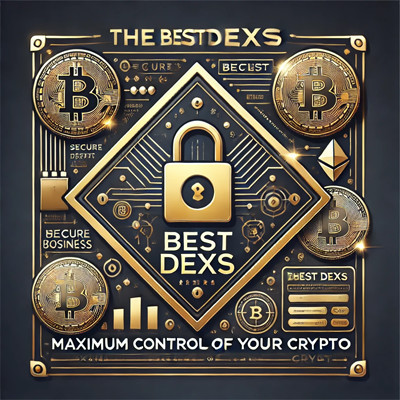
In the fast-paced world of cryptocurrency trading, Decentralized Exchanges (DEXs) stand out as a revolutionary solution for those seeking maximum control, security, and flexibility over their digital assets. Unlike traditional Centralized Exchanges (CEXs), DEXs empower users by eliminating intermediaries, reducing fees, and enhancing privacy. The transparency provided by blockchain technology ensures that all transactions are verifiable and secure, fostering greater trust within the crypto community.
By using a DEX, traders can experience true ownership of their assets, benefit from lower fees, and gain access to a wider range of tokens. The ability to participate in innovative DeFi opportunities, such as liquidity pools and yield farming, further enhances the appeal of DEXs. Platforms like Atomiq, Unibot, BULLX, and Photon are leading the way, each offering unique features and advantages tailored to different needs and preferences.
Whether you are a novice trader or a seasoned crypto enthusiast, exploring the world of DEXs can open up new possibilities and enhance your trading experience. As the cryptocurrency landscape continues to evolve, DEXs will undoubtedly play a crucial role in shaping the future of digital asset management. Embrace the power of decentralized trading and take control of your crypto journey with the best DEXs available today.